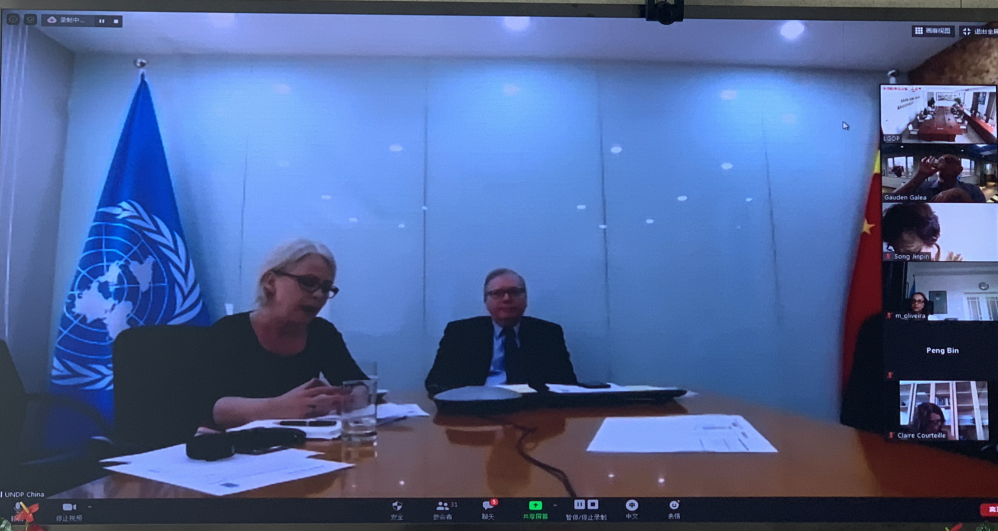Int’l organizations confident that China will eliminate absolute poverty on schedule
p.china.org.cn by Ye Kai,June 04, 2020 Adjust font size:
Representatives of intergovernmental organization (IGOs) and non-governmental organizations (NGOs) expressed confidence about China's poverty alleviation progress amidst the COVID-19 pandemic and provided insights to fuel China's efforts in this area in 2020 and beyond during an annual policy dialogue with the State Council Leading Group Office of Poverty Alleviation and Development (LGOP) that was conducted via videoconference on May 27.

The 2020 annual policy dialogue between the LGOP and representatives of international organizations is conducted via videoconference on May 27. [Photo by China.org.cn]
LGOP spokeswoman Su Guoxia reaffirmed China's resolve to eradicate absolute poverty by the end of 2020 and stated: “The COVID-19 pandemic won’t deter China's poverty eradication plans. The country has unwavering commitment to its poverty elimination goals. China is continuing to mobilize resources to promote efforts to help impoverished people via consumption and employment, strengthen supervision of poverty reduction work, and fortify systems meant to monitor people who have escaped from poverty and provide them with assistance in order to prevent them from falling back into it.”
“We congratulate the LGOP and the whole Chinese government for its sustained effort to eliminate absolute rural poverty and for the remarkable achievements that have been realized,” UN Resident Coordinator in China Nicholas Rosellini expressed.
On a recent trip to Shanxi, President Xi Jinping stressed, “Consolidating the poverty alleviation gains that have been made, preventing people who have escaped from poverty from falling back into it, and ensuring that people continue to increase their incomes and become more prosperous are the topics that concern me most as absolute poverty is eliminated.” Rosellini believed that Xi’s comments were very timely and noted that UN agencies are willing to find solutions to support China’s efforts to mitigate the impact of the COVID-19 pandemic on poverty alleviation.
Claire Courteille-Mulder, director of the International Labor Organization (ILO) Country Office for China and Mongolia, remarked: “The impact of the pandemic on the world of work is far-reaching and unprecedented. It is even worse than the impact of the 2009 and 2010 financial crisis. The most vulnerable parts of the population have been hit the hardest.” She suggested that China's government should expand social insurance coverage for rural migrant workers, promote flexible employment, and take advantage of the eldercare industry and the digital economy to offset unemployment pressure.
Smriti Aryal, head of the UN Women China Office, warned that the fallout from the pandemic could put a damper on women's role in economic activities and worsen their living conditions. China's newly released government work report made her more confident about the situation, however. “We are optimistic that women are intentionally targeted and included in the policy measures,” she commented.
Gauden Galea, World Health Organization representative in China, praised China’s performance in its fight against the COVID-19 pandemic and stated: “We note the measures taken during the COVID-19 response to take care of the impoverished and vulnerable, the free diagnosis and free treatment policy, and the additional public funding to subsidize the impoverished are commendable.”
Galea also indicated that he thinks that China’s experiences with poverty reduction and COVID-19 prevention and control have been inspiring. “China's experiences eradicating poverty and improving health equity continue to serve as [examples] to other countries. China can apply its lessons learned here to extend its international efforts on COVID-19 to contribute to greater solidarity and to reduction of poverty far beyond its borders.”
“[We are in the middle of] the deepest recession on record since the global recession in the 1930s,” World Bank Country Director for China and Mongolia Martin Raiser observed. “The Chinese government has not announced a growth target this year, which we think is a wise decision.” He believes the crisis highlights the need to build stronger public welfare systems and adjust social assistance policies in China to include new goals beyond eradicating extreme poverty.
LGOP spokeswoman Su also reminded participants that the Chinese government is cooperating with the international community to strengthen research on the impact of the COVID-19 pandemic on poverty reduction efforts around the globe and is providing intellectual support for international poverty alleviation exchanges and cooperative endeavors. She mentioned that new technologies, new media, and other innovative means should be used to promote the sharing of poverty reduction experiences between China and developing countries and to make public poverty reduction information available to the international community via cooperative development of poverty alleviation cases and joint implementation of poverty eradication pilot projects.
Inaugurated in 2018, the event was the third iteration of the annual policy dialogue and featured representatives from 18 international institutions, including UN organizations, the World Bank, the Asian Development Bank, the Bill & Melinda Gates Foundation, Heifer Hong Kong, and Mercy Corps.